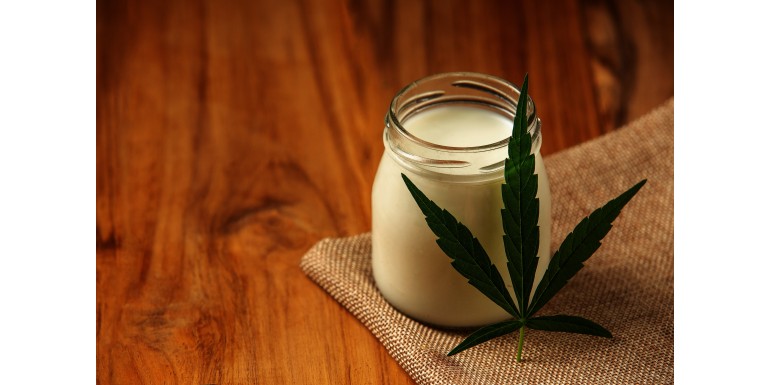
Drinking candy, CBD oil is everywhere
A few months ago, in the bar in my neighborhood, I noticed a new element on the map: a cold brew based on CBD. Usually, I prefer to avoid this kind of drinks that make me nervous and agitated. But I had heard about the potential soothing properties of CBD (cannabidiol abbreviation, non-toxicating cannabis compound) and I wondered if it would mitigate the stimulating effects of caffeine. A few minutes later, I was cautiously sipping it. And in fact, I stayed focused all the rest of the day. Was the CBD working?
The same question applies to the multitude of CBD foods and drinks that have recently come out on the market: chocolate pretzels, kombucha, vinaigrette, and even fried chicken, to name just a few. Some studies suggested that pure CBD oil could be promising for some health problems, but none examined food products containing CBD and therefore their effectiveness remains to be discussed.
Does CBD in food work?
First of all, even if it is very trendy in the world of well-being, the CBD “is not a panacea,” says James Giordano, professor of neurology and biochemistry at the medical centre of Georgetown University. Jeff Chen, Director of the Cannabis Research Initiative at the University of California, Los Angeles, is of the same opinion. So far, the Food and Drug Administration has approved a CBD based drug for a rare and severe form of epilepsy, while animal studies and "very preliminary" human tests suggest that CBD also has a therapeutic potential for other problems, such as anxiety and insomnia.
CBD belongs to a class of compounds called cannabinoids. It acts on the same receptors as endocannabinoids, neurotransmitters that the body naturally synthesizes. These receptors, present in the brain, are the endocannabinoid system, which is supposed to play a role in regulating many biological functions, including mood, sleep and pain. CBD can take different paths in the blood to go to the cannabinoid receptors of the brain, everything depends on how you consume it. For example, when inhaled or applied under the tongue, CBD reaches the brain fairly quickly, says James Giordano. But when ingested as an additive to a food or drink, it takes more time. Before being absorbed by the intestine in the bloodstream, CBD is metabolized in the liver, which inactivates a part of it and which means that the amount that reaches the brain ends up being much smaller than the amount ingested.
Jeff Chen notes that the dose of CBD used to relieve epilepsy, schizophrenia or anxiety in children during clinical trials was at least several hundred milligrams a day. In another study, however, 15 milligrams of CBD were sufficient to stimulate vigilance. This suggests that each condition or objective requires a different dose of CBD. However, the dose in many products is low: a CBD candy from the Hemp Bombs brand contains only 15 milligrams of CBD, for example, while a CBD Seltzer can of the Queen City brand contains 5 milligrams of hemp oil with CBD for 35 centilitres. Contacted by VICE, a representative from Queen City quoted the above-mentioned human research (very preliminary) and pointed out that CBD does not present the side effects that pharmaceuticals may have. Are the doses that people take only effective for what they try to treat? We don't know," said Chen.
That said, if you swear only by your nocturnal sweets at CBD, it does not necessarily mean that you feel a placebo effect. Some people are very sensitive to the CBD, and even low doses can have an effect on them," Giordano explains. He adds that the optimal point for most people is about 1 to 5 or 6 milligrams per 5 kilos of body weight. Therefore, for a woman of 50 kilograms, a dose of 10 milligrams should be effective.
What factors influence the effects of a CBD based food product?
As explained above, the dose you take plays an essential role. The higher the dose of CBD, the higher its absorption – that is, the amount that penetrates your bloodstream – and earlier and stronger you will feel the effects of it, says Giordano.
The preparation of the product also makes a difference. Everything in liquid form, as opposed to a solid form, will tend to increase its absorption," Giordano explains. It adds that, at the same time, temperatures above 180 degrees Celsius can degrade terpenes, active ingredients of CBD that enhance its effects. On the other hand, expose CBD oil to direct heat, for example placing it on a naked flame, can degrade its composition and decrease its power.
Whether you consume the compound with an empty or full stomach is also important. A recent analysis showed that the latter appears to improve absorption. As CBD is liposoluble, it is probably absorbed by blood as well as fat contained in the meal you just ingested, says Chen. It depends, however. Giordano notes that large fat cells of a particularly rich and fatty meal can cover the inner wall of the intestine, or mucous membrane, thus reducing the absorption of CBD in the blood.
Finally, your biological features also come into play. Everyone metabolizes and absorbs the CBD at different speeds, and can react differently once it is metabolized, some feeling increased effects and others of mitigated effects, explains Giordano.
Can the ingredients you add to CBD oil make the difference?
Given that CBD is liposoluble, its consumption in olive oil, for example, will generally allow a greater part of this substance to cross the intestinal mucosa and enter the bloodstream, Giordano explains. He adds that the same goes with fat emulsified or broken in droplets, present in foods such as chocolate and mayonnaise. Emulsion means the mixture of fat with an ingredient in which fat does not dissolve but breaks into droplets. These droplets easily cross the mucous membrane and the CBD can join them for the walk.
Some ingredients could amplify the well-being effects of the CBD. Sugar and even the simple taste of chocolate can cause feelings of pleasure in some people, but if you are looking for the same feeling with CBD, then a sweet and/or chocolate formulation infused with CBD could be "a double blow", according to Giordano.
How could caffeine affect my CBD experience in this cold infusion? Since caffeine accelerates metabolism and the body absorbs caffeine fairly quickly, you can get "a synergistic effect" from CBD and caffeine," Giordano explains. As to why the cold brew did not make me agitated, the CBD was able to counteract the effect of caffeine, he said. But everyone is different – in some people, caffeine can counter the calming effect of CBD. But again, given that CBD foods and beverages still need to be tested in humans, we cannot say with certainty how certain types of products or their ingredients influence the effects of CBD, says Chen.
Is it prudent to eat foods containing CBD?
Although a product label indicates that it contains 20 milligrams of CBD and no pollutants, CBD-based products are not regulated by the FDA and are therefore not required to be tested to confirm the manufacturer’s claims. This means that "people should really take the time to do research on products and companies that market them," Chen advises. A simple Google search is enough to see if negative reviews have been reported on this. It also recommends that you consult your doctor if you are already under treatment to ensure that CBD will react not badly.
If you are a novice in CBD, Giordano recommends that you “go slowly and gradually.”. Start with a milligram of CBD for 5 kilograms of body weight. Count 30 to 40 minutes to start feeling an effect. If you don't feel anything, wait a day and resume the same dose. Sometimes, the body needs to acclimate to the CBD," Giordano explains.
If you still feel nothing, wait the next day and increase your dose to two milligrams of CBD for 5 kilograms of body weight, and so on. Remember that for most people, the maximum dose is about 5 to 6 milligrams of CBD per 5 kilograms of body weight. Beyond this dose, you will probably secrete a lot of CBD because you will no longer get to absorb it and you could suffer negative effects such as fatigue, disorientation and anxiety, Giordano warns.
